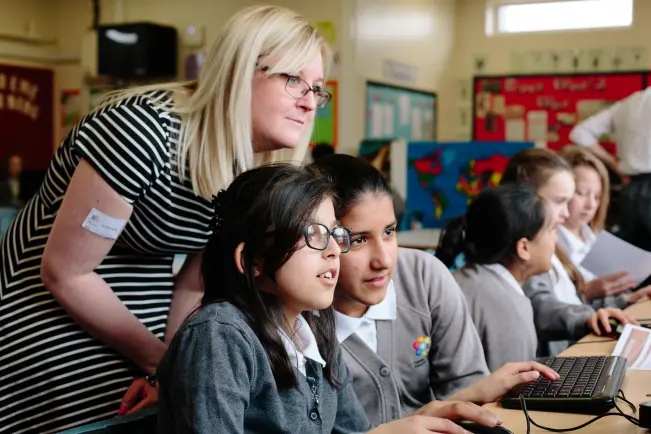Research seminars
We host free online seminars on current computing education research topics. Speakers from around the world present their work in the field.
This is your opportunity to learn from the latest research insights, make connections with fellow educators and researchers, and take part in discussions.
Get research seminar updates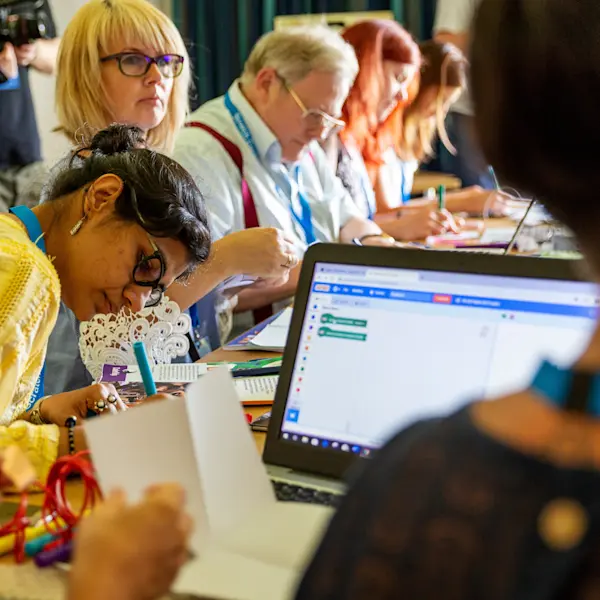
Our next research seminar
"Teaching AI to creators"
When: 17th March @ 17:00 - 18:30 (GMT)
Speaker: Rebecca Fiebrink (University of the Arts London)
Subject: In this seminar, Rebecca Fiebrink will explore the questions of how and why we might teach AI for creative practitioners, including children, students, and professionals. She will describe ways to understand the broad creative value of AI beyond the headline-grabbing systems that produce fully-formed media from text prompts. This includes the use of AI in making new types of creative works, and in making creative experiences more accessible.
Speaker bio: Rebecca Fiebrink is a Professor of Creative Computing at University of the Arts London. She has taught creative machine learning to university students, professional artists, members of the public, and children for over a decade.
Note: see below for the full seminar description and speaker bio.
Register for free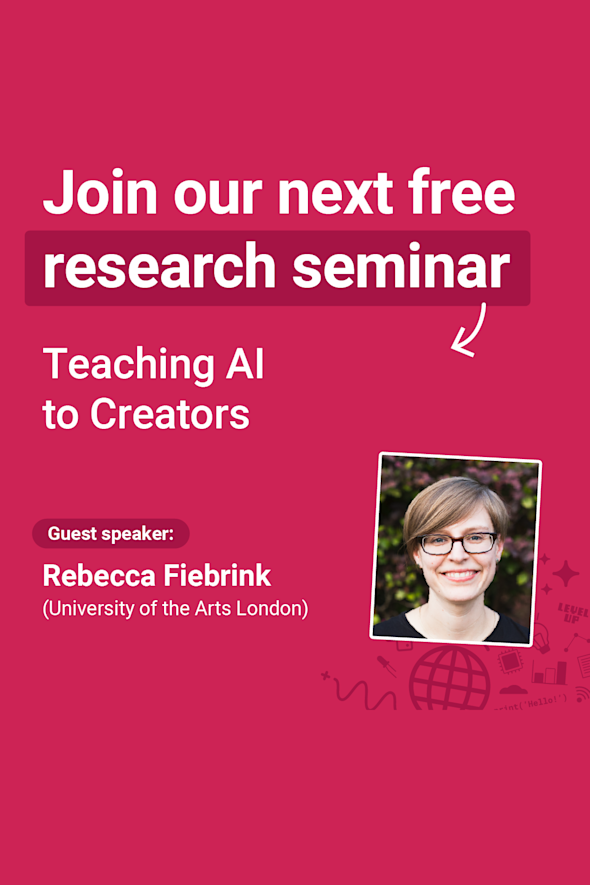
Our seminars: Applied AI / Teaching about AI across the curriculum
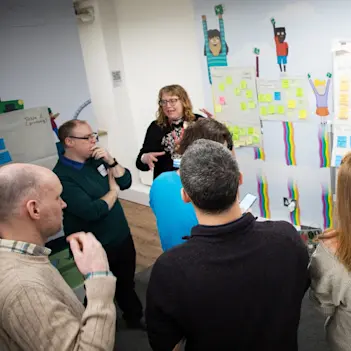
Our 2026 seminar series shifts the lens on AI education, exploring research on teaching and learning about AI from disciplines beyond computer science, including the arts, sciences, and humanities.
Seminars take place on the first Tuesday of each month at 17:00–18:30 GMT / 12:00–13:30 ET / 9:00–10:30 PT / 18:00–19:30 CET.
17th March: Rebecca Fiebrink (University of the Arts London)
Teaching AI to creators
In this seminar, Rebecca Fiebrink will explore the questions of how and why we might teach AI for creative practitioners, including children, students, and professionals. She will describe ways to understand the broad creative value of AI beyond the headline-grabbing systems that produce fully-formed media from text prompts. This includes the use of AI in making new types of creative works, and in making creative experiences more accessible. She will demonstrate some of the tools she and her collaborators have built to scaffold AI learning and support AI use in contexts including interactive art, musical instrument design, and design ideation.
Rebecca Fiebrink is a Professor of Creative Computing at University of the Arts London. She has taught creative machine learning to university students, professional artists, members of the public, and children for over a decade. In 2016, she launched the world's first online course (MOOC) about creative machine learning. She and her collaborators have also developed numerous open-source software tools for creative machine learning (e.g., Wekinator for artists and musicians, InteractML for game and VR developers), and these are used by hundreds of thousands of creators and students worldwide.
14th April: Kathryn Jessen Eller (Data Science, AI & You (DSAIY) in Healthcare)
Teaching youth to critically evaluate AI in healthcare while learning and applying data science and machine learning skills
In this seminar, Kathryn Jessen Eller will share how the Data Science, AI and You (DSAIY) in Healthcare programme combines a semester-long high school foundations course with current event datathons to help students understand how AI works and how it impacts society. She will describe how the course introduces essential ideas, graphing, statistics, correlation, and linear regression via free online programs such as CODAP as a foundation for interpreting Python-generated pair plots, scatterplots, boxplots, and histograms.
These visual tools and additional short engaging activities from sources like code.org help students learn to identify meaningful features, compare models, and understand supervised versus unsupervised learning. Students also learn to design, train, test, and refine a model. Kathryn will also discuss how students explore bias at every stage of the machine learning process, from data collection to model interpretation. Student collaboration with teachers, data scientists, and clinicians during DSAIY’s intergenerational healthcare datathons reinforces foundational concepts learned during the course.
Kathryn Jessen Eller is Principal Investigator of the National Science Foundation-funded Data Science, AI and You (DSAIY) in Healthcare program. Her work focuses on designing and studying data science and AI learning experiences that help high school students build statistical reasoning, interpret real-world datasets, understand core machine learning concepts, and recognise ethical and societal impacts of AI in medicine. DSAIY ensures that students are aware of their responsibility in the ethical use of AI. She collaborates with Brown University, MIT Critical Data, and Rhode Island secondary schools to broaden participation in AI and support youth in developing human-centered, critical AI literacy.
16 June: Gianfranco Polizzi (University of Birmingham)
More information coming soon.
14 July: Dan Verständig (Goethe University Frankfurt)
On critique as practice and critical computational literacy
Digital tools have increasingly been subjected to critique that exposes their biases, power dynamics, and societal implications. In consequence, educational research and interdisciplinary scholarship are not only challenged to engage with what it means to be “critical,” but also to reflect on critique itself. As computational technologies and algorithmic systems become woven into educational and civic infrastructures, the task is no longer merely to analyse their effects, but to develop frameworks that also reimagine technology’s role in education and society.
Against this background, this talk draws on historical perspectives on the relationship between romanticism and technology and argues that, together, art and science offer productive ways to overcome misconceptions about technology and to cultivate critique as practice. Romantic framings such as innovation as destiny, artificial intelligence as “mind,” or progress as inherently beneficial do not simply simplify complex systems; they shift responsibility and render political choices as technical inevitabilities. The talk proposes Critical Computational Literacy (CCL) as an educational response that treats computational systems as shaped by cultural, historical, and normative assumptions, rather than as neutral tools with the aim of supporting imagination, agency, participation and accountable educational practices in datafied worlds.
Dan Verständig is Professor of Educational Theory and Practices of Critical Computational Literacy at the Center for Critical Computational Studies (C3S), Goethe University Frankfurt. His research addresses learning in the context of digitality, with a focus on inequality, civic participation, and creative-critical approaches to coding and data literacy. He is a founding member of the Critical Big Data and Algorithmic Literacy Network (CBDALN) and works with experimental formats such as interactive installations, data-driven art, and playful methods to make digital infrastructures visible and reflect on their societal implications. He also advises NGOs on digital literacy and information security.
8th September: Jie Chao (The Concord Consortium)
More information coming soon.
6th October (7–8:30 pm BST): Eleni Petraki and Damith Herath (University of Canberra)
Advancing robotics education: directions for school and tertiary contexts
Robotics has long fascinated researchers and learners alike, and its significance has grown exponentially with the rise of artificial intelligence and automation in everyday life. This webinar explores the evolution of robotics education within STEAM disciplines, highlighting historical developments and current innovations that address the field’s multidisciplinary nature. While historically fields such as Artificial Intelligence, computer science and robotics were distinct disciplines, research is pointing to pedagogical approaches for integrated STEAM pedagogies. Drawing on the research within the first truly interdisciplinary textbooks (Herath and St-Onge, 2022), we illustrate the redesign of an engineering and robotics curriculum from an Australian tertiary course aimed at equipping future engineers with the diverse skills demanded by a growing workforce. The session concludes with evidence-based recommendations for best practices in robotics pedagogy, emphasising theory-driven methods and interdisciplinary learning approaches.
Eleni Petraki is an Associate Professor in Curriculum Design and Human–AI Education in the Faculty of Education at the University of Canberra. She has over 26 years of experience in language teaching and teacher education, spanning curriculum design, educational research, and applied linguistics. Eleni was a Chief Investigator and recipient of an ARC Discovery National Competitive Grant (2020–2025) in the field of machine education and artificial intelligence. Her research focuses on curriculum design, education for human–AI collaboration, artificial intelligence in education, and interaction analysis and communication.
Damith Herath is a Professor of Robotics and Art at the University of Canberra and leads the Collaborative Robotics Lab, a multidisciplinary research team with strong industry partnerships. An award-winning entrepreneur and a roboticist, Professor Herath has over two decades of experience leading complex robotic integration projects. In 2011, he founded Australia's first collaborative robotics startup, which was recognised as one of Australia's most innovative young tech companies in 2014. Professor Herath has also chaired several international workshops on Robots and Art and is the lead editor of the seminal book "Robots and Art: Exploring an Unlikely Symbiosis," a significant contribution to the field featuring leading roboticists and artists.
10th November: Doreen Boyd (University of Nottingham)
More information coming soon.
Catch up on previous seminars
We have had the privilege to learn from many incredible researchers since we started our seminars in 2020, and we're excited to share their talks with you. Explore the archives below to watch and read about past seminars.
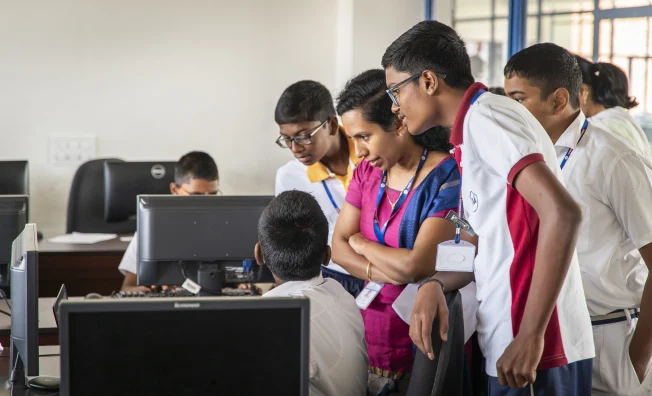
Seminar recordings
We make the seminar talks available to watch after they take place. Discover recordings from our current and previous series on programming; primary (K–5) computing; cross-disciplinary computing; artificial intelligence; and equity, diversity and inclusion.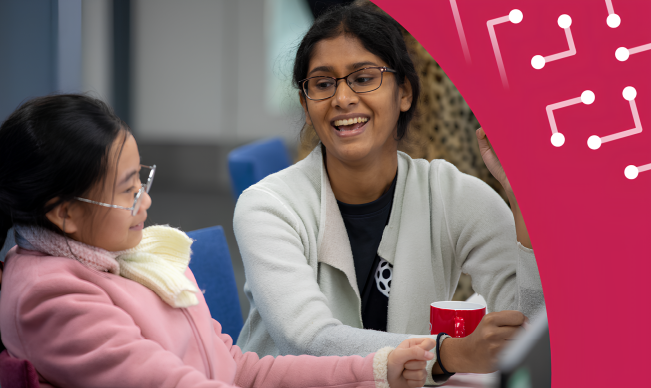
Summaries on the blog
After each seminar, we publish a short blog to sum up some of its main take-aways and share the video recording of the speaker's talk. Each blog highlights how the seminar applies to teachers' classroom practice. Browse the archive of seminar blogs.